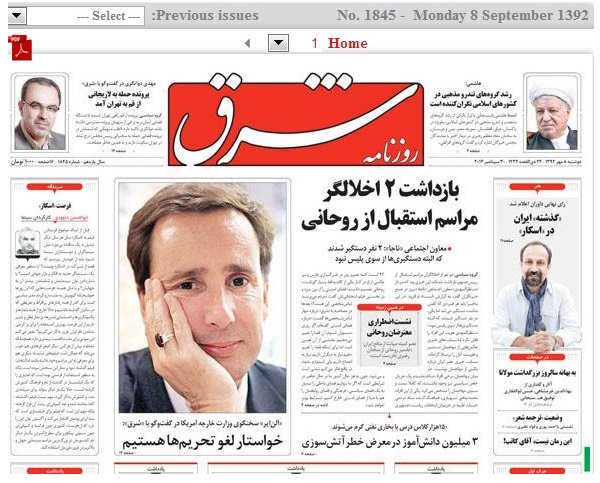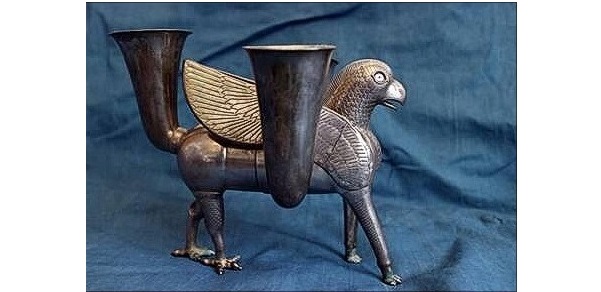Robin Wright
A week of remarkable U.S.-Iran diplomacy has been followed by other indications of shifting tones in both the Islamic Republic and the United States. Among the most startling was the headline “On the Wave of Telephone Diplomacy” in Iran’s Bahar newspaper.
 ***
*** Iran’s Shargh newspaper also ran a front-page interview with Alan Eyre, the State Department’s top Iran watcher. Eyre told The Iran Primer that it was his first interview with an Iranian paper—in Iran. The picture Shargh opted to use was almost wistful.
This is an excerpt translated by The Washington Post from the interview:
Shargh: How can closer ties between Iran and the U.S. help to resolve the nuclear issue?
Alan Eyre: As Obama and Rouhani remarked, the opposite is correct, that it is solving the nuclear issue that can be an important solution to mending the relations between two countries.
Shargh: What is the U.S. view on the diplomatic approach of the new president?
Alan Eyre: Both the president and Secretary of State strongly believe that there is an opportunity for diplomacy and we hope that the Iranian government uses it. We welcome the change in tone, but as always we say there is a big difference between words and action.

Among the other signs:
A new CNN/ORC International survey showed that three-quarters of Americans polled support diplomacy with Iran to solve the longstanding dispute over its controversial nuclear program. Only about 20 percent opposed negotiations.
The poll found that 87 percent of Democrats and 68 percent of Republicans surveyed supported talks with the Islamic Republic. The next round of negotiations between Iran and the world’s major powers is due to begin on October 15-16 in Geneva.
"Large majorities in all major demographic categories favor negotiations with Iran over their nuclear program, including 87% of Democrats and 68% of Republicans. This is nothing new for the U.S. public — in 2009, virtually the same number of Americans said they favored negotiations with Iran," said CNN Polling Director Keating Holland.
The poll found that 87 percent of Democrats and 68 percent of Republicans surveyed supported talks with the Islamic Republic. The next round of negotiations between Iran and the world’s major powers is due to begin on October 15-16 in Geneva.
"Large majorities in all major demographic categories favor negotiations with Iran over their nuclear program, including 87% of Democrats and 68% of Republicans. This is nothing new for the U.S. public — in 2009, virtually the same number of Americans said they favored negotiations with Iran," said CNN Polling Director Keating Holland.

The survey's overall sampling error is plus or minus 3.5 percentage points.
***
 The reaction to the first conversation between the Iranian and American presidents in more than three decades also got public endorsement from important sectors of the Iranian government “The world’s respect for our president is a result of our nation’s resistance,” said Qassem Soleimani (left), commander of the Qods Force, a unit of Iran’s Revolutionary Guard Corps, in an interview with Fars News Agency on September 28, one day after the telephone call between the two leaders.
The reaction to the first conversation between the Iranian and American presidents in more than three decades also got public endorsement from important sectors of the Iranian government “The world’s respect for our president is a result of our nation’s resistance,” said Qassem Soleimani (left), commander of the Qods Force, a unit of Iran’s Revolutionary Guard Corps, in an interview with Fars News Agency on September 28, one day after the telephone call between the two leaders.The head of the Iranian Parliament’s Foreign Affairs committee also backed the first contact. “Obama and Rouhani’s telephone conversation shows Iran’s power. When the U.S. president wants to talk with our president, it demonstrates that Iran’s position in the world is important,” said Alaeddin Boroujerdi told reporters in Tehran. Boroujerdi is considered a hardliner.
Former speaker of parliament Gholam Ali Haddad Adel, a hardliner who ran against Rouhani in the June election, said the telephone call with Obama “can create an atmosphere for Iran to become more active in the international arena.”
Not everyone was supportive, however, Revolutionary Guards chief Mohammad Ali Jafari said that Rouhani should have refused to take a call from his American counterpart. But just as he refused to meet Obama, he should also have refused to speak with him on the telephone and should have waited for concrete action by the United States," Jafari told the Tasnimnews.com website.
The Guards chief also issued a thinly veiled warning to Rouhani that the damage could be “repaired.” He told the news agency, "If we see errors being made by officials, the revolutionary forces will issue the necessary warnings.”
The Guards, charged with protecting the revolution, appear to be taking a harder line than the political elite. Gen. Amir-Ali Hadjizadeh, who heads the Revolutionary guards air corps, said, "US hostility can't be forgotten with a phone call and a smile."
***
In the latest of his many English-language tweets, President Hassan Rouhani announced yet another potential new connection with the United States: Direct flights between Tehran and New York. The first tweet was by @MeetIran, which may be a public diplomacy outreach site. It was launched just before Rouhani’s visit to New York. The item was almost immediately retweeted by the president’s semi-official Twitter account.

***
The State Department turned to Twitter too to announce what was effectively a farewell gift for President Rouhani on September 27, the day of his departure from New York. The United States returned a 2,700-year-old silver chalice from ancient Persia. The ceremonial drinking vessel—known as a rhyton—is in the shape of a mythical beast, with a lion’s body and a bird’s head. It comes from the Achaemenid dynasty. It had been confiscated by U.S. customs and held for many years.
“We are taking this as America’s souvenir to the Iranian people,” Iranian Vice President Mohammad Ali Najafi told CNN. “I adamantly believe in cultural diplomacy, and I believe the thing that could improve relations between the U.S. and Iran after the years and softens the harshness of his relationship is cultural diplomacy.” Najafi, who is one of several vice presidents, is also head of the Cultural Heritage and Tourism Organization.
“We are taking this as America’s souvenir to the Iranian people,” Iranian Vice President Mohammad Ali Najafi told CNN. “I adamantly believe in cultural diplomacy, and I believe the thing that could improve relations between the U.S. and Iran after the years and softens the harshness of his relationship is cultural diplomacy.” Najafi, who is one of several vice presidents, is also head of the Cultural Heritage and Tourism Organization.

***
On the same day that Rouhani and Obama spoke, the World Bank announced that Iran had resumed payment on old loans. Tehran had not made any repayments during 2013. In July, it blamed Western sanctions for complicating its ability to transfer funds through an intermediary. Iran’s loans, which all predate 2005, now total $616 million. Neither Iran nor the World Bank have provided any further details about why payments were halted or why they have now resumed. But the timing was striking.
Robin Wright has traveled to Iran dozens of times since 1973. She has covered several elections, including the 2009 presidential vote. She is the author of several books on Iran, including "The Last Great Revolution: Turmoil and transformation in Iran" and "The Iran Primer: Power, Politics and US Policy." She is a joint scholar at USIP and the Woodrow Wilson Center.
